Intro
Identify dehydration symptoms with our guide on 10 signs, including fatigue, headaches, and dark urine, to learn how to prevent and treat dehydration effectively, recognizing early warning signs and staying hydrated for overall health and wellness.
Dehydration is a common condition that occurs when the body loses more fluids than it takes in, causing an insufficient amount of water and other fluids to carry out its normal functions. This can happen for a variety of reasons, such as not drinking enough water, exercising or playing sports without replenishing lost fluids, or having a medical condition that causes excessive urination or diarrhea. Dehydration can affect anyone, regardless of age or health status, and it's essential to recognize the signs and symptoms to take prompt action and prevent complications. In this article, we'll explore the 10 signs of dehydration, its causes, and what you can do to prevent and treat it.
Dehydration can range from mild to severe, and its symptoms can vary depending on the individual and the severity of the condition. Mild dehydration may cause few symptoms, while severe dehydration can lead to serious complications, such as kidney damage, heat stroke, and even death. It's crucial to be aware of the signs of dehydration to seek medical attention if necessary. Dehydration can also have a significant impact on daily life, causing fatigue, headaches, and difficulty concentrating, making it challenging to perform daily tasks and maintain productivity.
The importance of recognizing the signs of dehydration cannot be overstated. Dehydration can affect anyone, regardless of age or health status, and it's essential to take proactive steps to prevent it. By understanding the causes and symptoms of dehydration, individuals can take measures to stay hydrated, especially during hot weather, intense physical activity, or when experiencing illnesses that cause excessive fluid loss. In the following sections, we'll delve into the 10 signs of dehydration, its causes, and what you can do to prevent and treat it.
Introduction to Dehydration
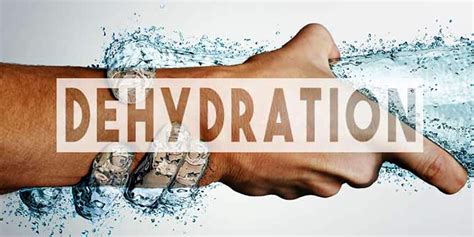
Causes of Dehydration
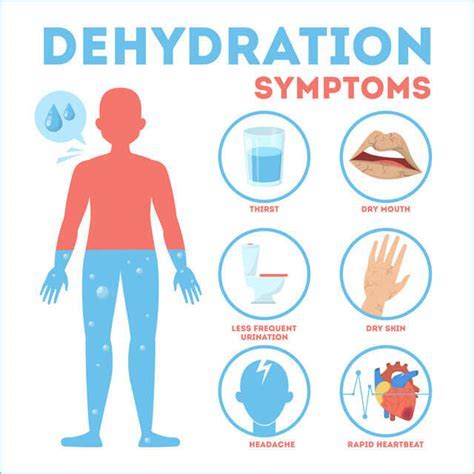
Common Causes of Dehydration
Some common causes of dehydration include: * Diarrhea and vomiting * Excessive sweating * Fever * Certain medications, such as diuretics * Medical conditions, such as diabetes and kidney disease10 Signs of Dehydration
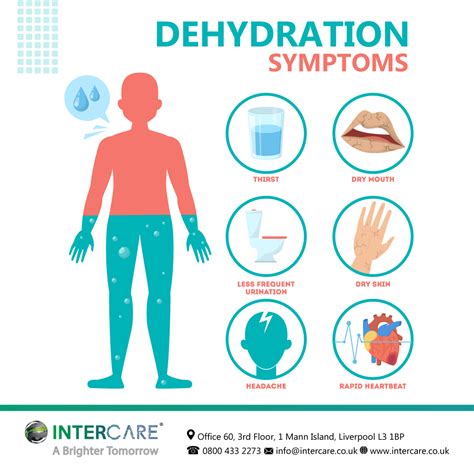
Recognizing the Signs of Dehydration
It's essential to recognize the signs of dehydration to take prompt action and prevent complications. If you're experiencing any of the above symptoms, it's crucial to drink plenty of water and seek medical attention if necessary.Preventing Dehydration
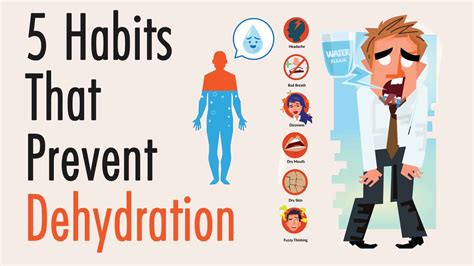
Staying Hydrated in Hot Weather
Staying hydrated in hot weather is crucial to preventing dehydration. Here are some tips to help you stay hydrated in hot weather: * Drink plenty of water before, during, and after outdoor activities * Avoid exercising or engaging in physical activity during the hottest part of the day * Wear lightweight, light-colored clothing to help keep you cool * Take regular breaks to drink water and rest in the shadeTreating Dehydration
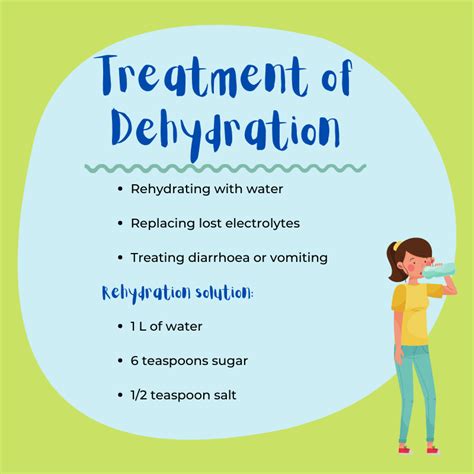
Treating Mild Dehydration
Mild dehydration can be treated by: * Drinking plenty of water and electrolyte-rich beverages * Eating foods that are high in water content, such as fruits and vegetables * Avoiding sugary drinks and caffeine * Taking regular breaks to drink water and restTreating Severe Dehydration
Severe dehydration may require medical attention and: * Intravenous fluids to replenish lost fluids and electrolytes * Medications to treat underlying medical conditions * Hospitalization to monitor and treat complicationsWhat are the symptoms of dehydration?
+The symptoms of dehydration include dry mouth and throat, fatigue and weakness, headaches, dizziness and lightheadedness, dark urine, decreased urine output, rapid heartbeat, low blood pressure, sunken eyes, and muscle cramps.
How can I prevent dehydration?
+You can prevent dehydration by drinking plenty of water, eating foods that are high in water content, avoiding sugary drinks and caffeine, taking regular breaks to drink water when exercising or engaging in physical activity, and monitoring your urine output and color.
What is the treatment for dehydration?
+The treatment for dehydration depends on the severity of the condition. Mild dehydration can be treated by drinking plenty of water and electrolyte-rich beverages, while severe dehydration may require medical attention and intravenous fluids.
In
Final Thoughts

